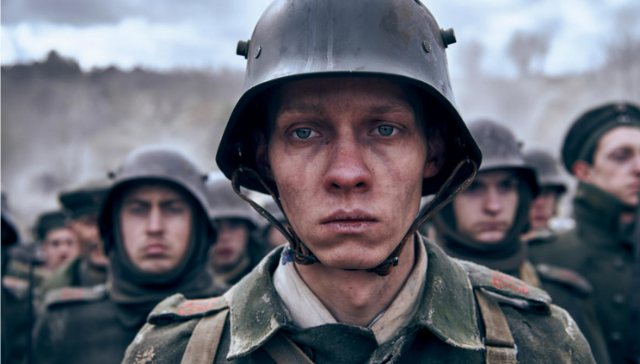War is hopeless. It is destructive and it sets people, countries, continents back by decades; sometimes even longer. _All Quiet on the Western Front_ (Netflix), the German entry to the Oscar Best Foreign Film category, re-focuses on the futility of war and the all-encompassing waste that it brings in its wake. Anti-war films proliferate on Indian OTT, a great sub-genre to explore, with learnings and details that history books and popular media has left out for the most part. There is no glory in dying in a war. The Russian invasion of Ukraine, a war that has played out right before us this year, proves that. Filmmakers have focused on this aspect of war diligently in the past few years, recreating grand cinematic tales that enhance themselves with cutting edge filmmaking technology and present a sensory overload to drive home a point- war is waste. Edward Berger has remade the original American film that set a benchmark in anti-war epic filmmaking in 1930. Adapted from Erich Maria Remarque’s 1929 World War One novel, this time, the film is set in Germany. Youth are inspired by their teachers to fight for the fatherland in the Great War, seeking valour. But reality is far from glorious. Young boys, who step out of their homes and villages to fight for the great fatherland die, blown to bits, strewn like bits of paper and maimed in a manner that is never quite stated in war tales. In a scene, a character walks into a room strewn with corpses of fellow men, and states, after this war, Germany will be empty. The film is shocking, a bit overwhelming while watched on a laptop or small screen; but evocative and poignant. By remaking this novel in German, Berger has also successfully set forth a strong argument- that war damaged people on both sides of the World Wars in equal, terrible measure; Germans suffered just as much as the British, French or Americans did. All Quiet on the Western Front features winning performances by Daniel Bruhl, Felix Kammerer and Albrecht Schuch, becoming characters that you stay with you much after you stop watching the film. Anti-war films effectively undo the narrative of bravery of battles. Christopher Nolan’s _Dunkirk_ (Prime Video) is one of the most innovative audio-visual interpretations of this. Dunkirk was a colossal failure in war planning by the Allied Forces, particularly the British army. The film, cutting across time lines, and with a ticking clock giving you goosebumps ever so often, becomes a hard tale of survival, highlighting the unsung bravery of a few good men. Nolan will also tackle a dark-toned anti-war narrative in his upcoming film, Oppenheimer. This will look at the man whose mind created the atomic bomb, and it is definitely not expected to be a kind-hearted look.
Taika Waititi’s _Jojo Rabbit_ (Hotstar) is another smart and sarcastic interpretation of the unacceptable narrative that Nazi Germany brought to its war. Told from the point of view of a young kid, this film is essentially a mother-son story with a young Jew girl bringing in the point of view of a cynical sufferer. War doesn’t play out on the frontlines here. Instead, it is fought in thought, belief, ideal and indoctrination. It is also about adults that do everything in their power to protect young ones from getting brainwashed, sometimes, putting their own lives on the firing line. Jojo Rabbit is a moving film despite its light-hearted tone. We live in polarised times, with a large section of media showing bias in reportage. A film like Jojo Rabbit is essential viewing, to understand, that one must learn to think for oneself and make choices by oneself, even when teachers or the newspapers might be saying something totally different. Anti-war films take on serious interpretations in some like American Sniper (Netflix) where a veteran’s return to normal life is a much bigger battle than his stint in a violent, unfair war (the second Iraq War); and a satirical tone in the Brad Pitt starrer War Machine where a war minded general wreaks havoc regularly and has little to answer for. The genre per se is as old as the talkies, with filmmakers taking on the mantle of truth-telling from the beginning. In fact, Charlie Chaplin’s The Great Dictator (1940), like the original All Quiet on the Western Front, pioneered anti-war cinema. In recent years, filmmakers have told such stories from a variety of points of view, changing the approach on war stories. Fighting and dying on battle fronts is not grand or glorious. It is futile. It often paves the way to further violence and empowers hyper nationalistic politics. Cinema has struck a fine balance by making and presenting anti-war films, giving people a chance to absorb and understand the ground reality of battles from a common person’s perspective. Archita Kashyap is an experienced journalist and writer on film, music, and pop culture. She has handled entertainment content for broadcast news and digital platforms over 15 years. Read all the Latest News , Trending News , Cricket News , Bollywood News , India News and Entertainment News here. Follow us on Facebook, Twitter and Instagram.


)
)
)
)
)
)
)
)
)



